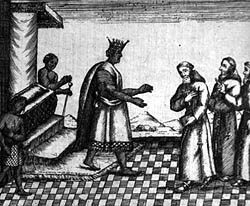The First African “American” Family
“Antoney Negro and Isabell Negro and William theire[sic] child baptised [sic]” found in the Virginia Census of 1624 are the first African family recorded in the Chesapeake (Hotten 1874 as cited in McCartney 2000 Vol. I:174; Breen and Innes 1980).
The African origins of Antoney and Isabell are not clear in this brief citation. However, history supports the likelihood that Antoney and Isabell were possibly from the Kongo and may have been exposed to Christianity.
Beginning in the 17th century, the Dutch were determined to wrest control of the slave trade from the Portuguese. The slaves brought to Virginia were taken from Portuguese by Dutch Man-of War ships and traded with the Virginians for provisions. The Dutch ships also captured Portuguese forts along the coast of Africa and finally dominated the trade from 1600–1700.
The people sold from the West Central African coastal forts claimed by the Dutch, had been in contact with the Portuguese since the 1400s. The Portuguese had introduced Christianity, first to royalty and later to commoners through Capuchin monks and indigenous African Catholic priests.
As early as 1516, a missionary writing about the King of the Kongo to the King of Portugal, said:
“‘that he…(King Alfonso I 1506])…is very just and that he greatly punishes those who adore idols and that he burns them with their idols,…throughout his kingdom he has sent many men, natives of the country, Christians, who have schools and teach our saintly faith to the people, and there are also schools for girls where one of his sisters teaches, a woman who is easily sixty years old, and who knows how to read very well and who is learned in her old age. (Rui de Aguiar, Portuguese missionary to King Manuel of Portugal May 25, 1516 as cited in Littinga 2000).’”
In this drawing, Cavazzi, a capuchin missionary to the Kongo 1664–1667, depicts the King of the Kongo receiving Capuchin monks (Cavazzi 1690).
Portuguese missionaries wrote KiKongo dictionaries and grammars and brought many translations of Portuguese religious texts. Through the process of ordination, a local literate class of BaKongo Catholic priests developed. The translations of Christian doctrine into the local language, KiKongo, was done such that words like spirit, god, and holy were rendered directly equivalent to existing concepts in Kongo cosmology. Missionary documents from the 17th century claimed that they had found a people who believed in a single god but did not know his name. Seventeenth century Kongo art forms confirm that at least some of 17th century Kongo people were Christians. In parts of Kongo, Christianity was accepted not as a new religion that would replace the old, but rather as a new syncretic cult that was fully compatible with existing systems of meaning (Ross 2004).
In the Kongo, by 1619 after 200 years of contact with the Portuguese the African and mestizo priests, along with Jesuits and Capuchin monks, succeeded in partially Christianizing ordinary Kongo people in towns (Birmingham, 1981:57).
A hundred years later, Christianity beliefs and practices were reported to persist among enslaved African people from the Kongo. “The Congos”…wrote Oldendorp in 1767…“in comparison to other Africans coming to the West Indies…“have for the most part, a recognition of the true God and Jesus Christ and are more intelligent and cultures than other Blacks. This is due to the influence of the Portuguese who from their arrival on the coast…[of West Central Africa]…made an effort to enlighten and better this unknowledgeable people…those who live far from them deep in the inland had a religion that was a combination of Christian ceremonies and heathen superstitions…Only the Congo, who through the Portuguese are familiar with the Christian teaching have been baptized and have monogamous marriages…(Oldendorp [1767] translated by Highfield and Barac 1987).” Oldendorp’s observations lend credence to the conjecture that Congoes arriving in Virginia in the the early 1600’s may have held similar beliefs and customs.
Traditionally the BaKongo were traders, farmers, and ironworkers. They placed importance on relationships within the kin group. A man valued his wife because of the children she could give him, the garden that she provided for him and her ability to cook. Even in the present, traditional African values of community solidarity are still more important than individual initiative in the Kongo community (International Mission Board 2004). Thus, when Antoney Negro and Isabell Negro brought their child for baptism they may have been conforming to traditional African and traditional Christian values.








